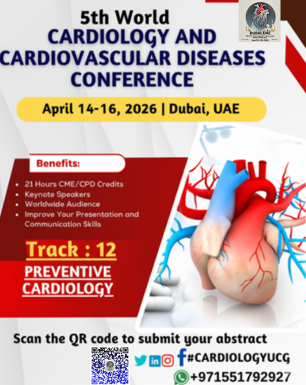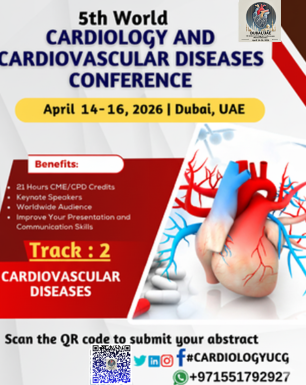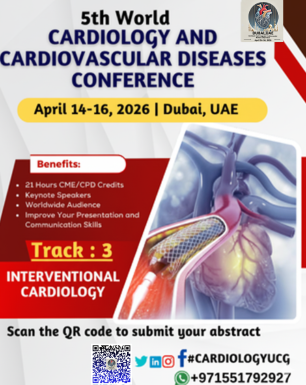Sub Tracks preventive-cardiology :
Cardiovascular Risk Assessment, Lifestyle Modifications, Cholesterol Management, Hypertension Management, Diabetes and Cardiovascular Health, Smoking Cessation, Weight Management, Physical Activity and Exercise, Dietary Recommendations, Lipid Lowering Therapy, Statins and Other Medications, Antithrombotic Therapy, Screening for Heart Disease, Family History and Genetic Risk, Primary Prevention of Heart Disease, Cardiovascular Screening Programs,
What is preventive-cardiology?
Preventive cardiology is a branch of cardiology that focuses on the
prevention of heart disease and cardiovascular conditions. The primary goal of
preventive cardiology is to reduce the risk factors associated with heart
disease and promote heart health through lifestyle changes, early detection,
medical management, and education. By identifying and addressing risk factors
early, preventive cardiology aims to reduce the incidence of heart attacks,
strokes, heart failure, and other cardiovascular diseases (CVD).
Key Areas of Preventive Cardiology:
1.
Cardiovascular
Risk Assessment:
- Preventive
cardiologists assess a patient’s risk for cardiovascular diseases based
on various factors such as age, gender, family history, lifestyle, and
the presence of conditions like hypertension, diabetes, and high
cholesterol. Tools like Framingham
Risk Score or ASCVD
Risk Calculator are used to estimate the risk of
cardiovascular events over time.
2.
Lifestyle
Modifications:
- A
cornerstone of preventive cardiology is promoting heart-healthy
lifestyles. This includes:
- Dietary Changes:
Encouraging a diet low in saturated fats, high in fruits, vegetables,
whole grains, and lean proteins (such as the Mediterranean diet or DASH diet).
- Exercise: Recommending
regular physical activity (e.g., 150 minutes of moderate-intensity
exercise per week) to improve heart function, lower cholesterol, and
maintain healthy weight.
- Weight Management:
Encouraging healthy weight loss or maintenance to reduce the strain on
the heart and decrease the risk of conditions like hypertension,
diabetes, and obesity.
3.
Cholesterol
Management:
- High
levels of LDL cholesterol (often called "bad cholesterol") are
a significant risk factor for coronary artery disease. Preventive
cardiology involves managing cholesterol through dietary changes,
exercise, and medications like statins.
4.
Hypertension
Management:
- High
blood pressure is a major contributor to heart disease and stroke.
Preventive cardiologists focus on detecting high blood pressure early and
managing it with lifestyle changes and medications like ACE inhibitors,
calcium channel blockers, and diuretics.
5.
Diabetes
and Cardiovascular Health:
- People
with diabetes or pre-diabetes have a higher risk of developing
cardiovascular diseases. Preventive cardiology involves managing blood
sugar levels and controlling risk factors such as high cholesterol and
high blood pressure.
6.
Smoking
Cessation:
- Smoking
is a major cause of cardiovascular disease. Preventive cardiologists work
with patients to quit smoking, often offering counseling, medications
(e.g., nicotine replacement therapy), and behavioral strategies to help
stop smoking.
7.
Physical
Activity and Exercise:
- Regular
physical activity is vital for preventing heart disease. Preventive
cardiologists encourage exercise to improve heart function, reduce blood
pressure, lower cholesterol levels, and maintain a healthy weight.
8.
Stress
Management:
- Chronic
stress can contribute to high blood pressure, heart disease, and stroke.
Preventive cardiology involves helping patients manage stress through
relaxation techniques, counseling, mindfulness, or physical activity.
9.
Dietary
Recommendations:
- A
heart-healthy diet rich in nutrients like fiber, antioxidants, and
healthy fats is a key aspect of preventive cardiology. Cardiologists
recommend diets such as the Mediterranean
Diet and DASH
Diet to reduce the risk of CVD.
10. Lipid Lowering Therapy:
- Medications
like statins are commonly
prescribed to lower cholesterol levels and reduce the risk of heart
attacks and strokes. Preventive cardiologists monitor cholesterol levels
to determine the need for therapy.
11. Statins and Other Medications:
- Statins,
PCSK9 inhibitors, and
other medications may be used to lower cholesterol levels and prevent
heart disease, particularly in patients at high risk.
12. Antithrombotic Therapy:
- Preventive
cardiology may also include the use of antiplatelet therapy (e.g., aspirin) or
anticoagulants to prevent the formation of blood clots in patients at
risk of heart attacks or strokes.
13. Screening for Heart Disease:
- Regular
screening for risk factors like high blood pressure, high cholesterol,
and diabetes is a key part of preventive cardiology. Early detection of
these risk factors allows for timely intervention to reduce the risk of
heart disease.
14. Family History and Genetic Risk:
- Family
history plays a significant role in cardiovascular disease risk.
Preventive cardiologists consider genetic factors in risk assessments and
recommend earlier or more aggressive interventions for those with a
family history of heart disease.
15. Primary Prevention of Heart Disease:
- Primary
prevention focuses on preventing the onset of heart disease in
individuals who have not yet developed cardiovascular conditions but are
at risk. This includes modifying risk factors such as high cholesterol,
hypertension, and smoking.
16. Cardiovascular Screening Programs:
- Many
preventive cardiologists run screening programs to identify early signs
of heart disease or other cardiovascular issues in asymptomatic
individuals. These may include cholesterol checks, blood pressure
monitoring, and echocardiograms.
17. Mental Health and Cardiovascular Risk:
- Stress,
depression, and anxiety can increase the risk of heart disease.
Preventive cardiology emphasizes the connection between mental health and
cardiovascular health and addresses these factors through counseling,
therapy, and medication.
18. Sleep Apnea and Cardiovascular Disease:
- Sleep
apnea, especially obstructive
sleep apnea, is associated with a higher risk of high
blood pressure, arrhythmias, heart failure, and stroke. Preventive
cardiology includes screening for sleep apnea and treating it to reduce
cardiovascular risks.
19. Hormone Replacement Therapy and Heart Health:
- For
postmenopausal women, the use of hormone replacement therapy (HRT) can
have both benefits and risks related to heart health. Preventive
cardiologists assess the individual risk before recommending HRT.
20. Chronic Disease Management:
- Preventive
cardiology also involves managing other chronic conditions like obesity,
chronic kidney disease, and metabolic syndrome, which contribute to cardiovascular
risk.





